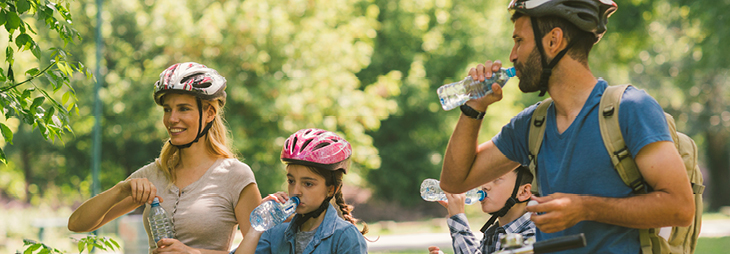
In a typical Arkansas summer when the temperatures soar outside, we find comfort inside — in air conditioning, near a fan, at the pool or anywhere that can give us relief. However, bigger problems could lurk when we go back outside. Not acclimating to the heat and humidity or staying hydrated can have consequences on student athletes, kids, adults and the elderly. Here are some tips on ways to keep your heart healthy by staying cool this summer.
“Gradually increase your exposure to the heat. Maybe walk in the morning, go out in the cooler times of the day and build yourself up,” says one of the experts at Arkansas Heart Hospital. “Don’t try to do too much in one day. For example, don’t cut the grass, work in the garden and paint the house. Even if you are acclimated, the hottest part of the day is still dangerous.”
We recommend getting students outside, too. Regardless of if they have camp or outdoor practices such as football or band, their bodies need to be able to handle going from air conditioning to the heat. “Be proactive. Introduce them to the heat and make sure they are staying hydrated. Eliminate caffeinated drinks and other things that could dehydrate them.”
When it comes to hydration, water is better than other fluids. If you are physically active and spending an hour or more outside, hydrate with an electrolyte beverage along with water.
“You can’t wait to be thirsty,” the experts say. “Carry water with you. Everyone should be drinking something non-caffeinated.”
Staying hydrated is important even while at the swimming pool. “You and your kids can still get dehydrated. If you’ve been there a few hours and no one has gone to the bathroom, you’re probably dehydrated.”
Headaches and crankiness can be signs of dehydration in kids. “The best way to know if someone is hydrated is the color of their urine. It should be clear to pale yellow. Drink every hour. Don’t go 2-3 hours without fluids. Don’t go from breakfast to lunch without drinking water in this Arkansas summer heat.”
Finally, be mindful of heat related illnesses like heat exhaustion and heat stroke. “Heat exhaustion is overdoing it while not properly hydrating. You’ll feel the effects, such as a headache, chills, being lethargic, possibly cramping.” In some extreme cases, the person requires IV fluids to rehydrate.
“Heat stroke is when your core body temperature rises to 104 degrees,” say our experts. “It can be as damaging as a stroke. Organs shut down and it can cause neurological problems similar to a traumatic brain injury. After recovery you are more sensitive to the heat. You have to be mindful forever.”